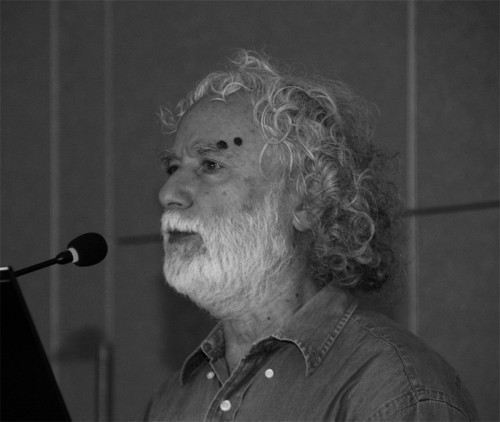
Son of Marinos Kouroupos from the island of Cephalonia and Maria nee Tsitsiridaki from Chania, Crete. Nurtured in a musical environment. At the age of 7 he was accompanying his father on guitar at regular meetings of Serenaders from the Ionian Islands. His direct experience and practical involvement in music, improvisations, musical synchronizations and remixes that were experiential and required a high level of readiness, led him very quickly to composition.
He studied music at the Conservatory of Athens (1953-1965, piano diploma) with Professors Catherine Pantzaris, Spiros Farantatos, Dimitris Maris and Maria Chairogiorgou. Between 1959 and 1968 he participated as pianist in all of the recordings and concerts by Manos Hadjidakis, whose influence made him compose several songs, some of which became commercial hits and won prizes in Greek Song Festivals. Nevertheless he did not lose focus from his main goals in music, so after his graduation from the Athens University School of Mathematics (BA, 1967) he composed his first major work,Antiphonies, based on texts from the David’s psalms VI, XXII, XLVI.
He worked for about six months as assistant of Yiannis Christou, he wrote music for Euripides’ Rhesus that was staged by the National Theater at Epidaurus in the summer of 1968, and, shortly after, he went to Paris on a grant from the French government. During the four-year study with Olivier Messiaen at the Conservatoire (1968-1972) he assimilated the latest trends of contemporary technique, with a particular focus on two topics: song (Quicksand, 1968 / Greek Song, 1970 /Lai, 1971) and musical theater with a series of Greek themes, which until today make up one of the main core of his work (Homériques I, 1969 / Homériques II, 1970 / Assemblywomen (Ecclesiazusae), 1971 / Hermes and Prometheus, 1971-73).
After his graduation, he worked as an assistant professor at the Conservatoire, and from 1972 to 1976 he was responsible for the organization and promotion of musical events of the Cultural Center of Créteil in the suburbs of Paris. Works of his were performed many times in Paris and many other cities in France and Europe [Study on geometrical progressions, 1971 / Affrontement (commissioned by the Festival de Royan), 1972 / Abstr’ Acte, 1974], while the particular success of his great stage creations (Hermes and Prometheus, 1973 / Les enfants du sable, 1974 / Babel Tower, 1976) resulted in significant collaborations: in 1975 with stage designer-director Yannis Kokkos for the staging of the musical Dieu le veut, inspired by historical episodes of the Crusades, and a little later, in 1977, with director Antoine Vitez, for his dramatic workGrisélides – both at the Festival d’Avignon.
Having already begun to discern the stalemate of the new trends of the vanguard and feeling discomposed by the arrogance and the limitations imposed by that circle, George Kouroupos returned to Greece in 1977, at a time when his European career was at its prime. That was the time when he returned to a more melodic idiom and economy of means (Six Songs for mice, 1979 / Impromptu, in memory of Yannis Christou, a commission by the Contemporary Music Ensemble Alea III, 1980) and started working intensively on musical theater scores. From 1986 onwards (Milk of Aegialus, 1986 / Introduction to The Box by Aris Alexandrou, 1987) the fine processing of musical tissue and dramatic condensation of expression are standing out; highlights are the works Hommage to Odysseus Elytis (1990) and Pylades (opera, commissioned by the Athens Concert Hall, 1991). In 1984, he was awarded the “Nikos Kazantzakis” prize by the Municipality of Heraklion, Crete.
The 1991-2000 decade was very productive: many theater music scores (Electra, Medea, Oedipus at Colonus, Helen in Epidaurus, Andromache, 1994 at the Athens Concert Hall and the Festival d’Avignon, etc.), two song cycles, the symphonic ballet Odyssey in 1995, choreographed by John Neumeier, a co-production of the Athens Concert Hall and the Opera in Hamburg, which staged more than 50 performances around the world (including those in the Royal Danish Opera in 2003). For this music score, he was awarded the international prize Benois de la danse in 1996. Other important works of that last period are: the opera The fugitives of the Chessboard in libretto written by Eugene Trivizas (National Opera, 1998), Divertimenti for Casanova, a ballet choreographed by Carol Armitage (Athens Festival, 2000), Concertino for piano and orchestra, the opera The Fir Tree Boat, in libretto written by Julitta Iliopoulou, commissioned by the Center of Choral Music in the island of Cephalonia, the lyric tragedy Jocasta (texts by Julitta Iliopoulou), for actor, soprano, bass, male choir and small orchestra, commissioned by the Center for Cultural Initiatives and Communications “The human voice ” of the Municipality of Veria, the Monogram, in September 2004, as part of events organized by the Athens 2004 (Organization Committee for the Olympic Games) etc.
At the same time, George Kouroupos has a remarkable activity in various administrative positions: deputy director of the Third Program of the Greek National Radio (1977-81), president of the Greek National Opera (1982-84/1994-99), director of the music department of Kalamata’s Municipal Cultural Development Enterprise (1985-1990) and Artistic Director of the Orchestra of Colors (1995-2010). He is a member of the Greek Composers’ Union, a member of the Society Ancient Greek Drama Music and professor emeritus of the Department of Music Studies of the Ionian University.